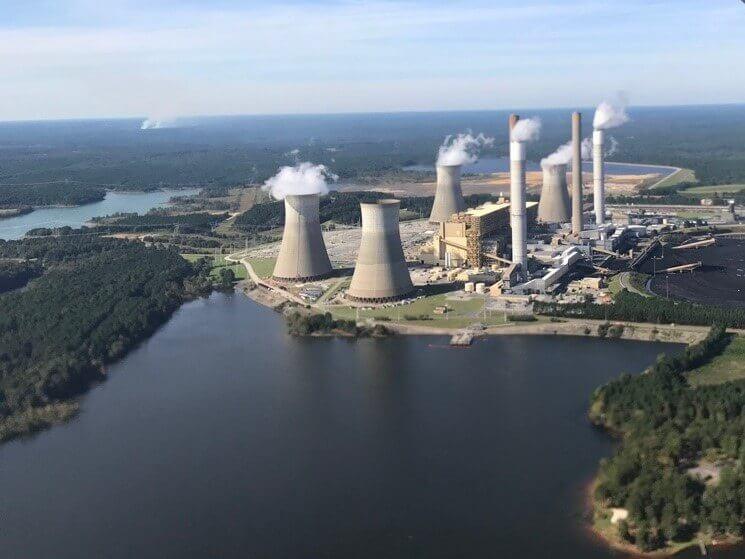
Caption
Plant Scherer in Juliette is one of the five plants where Georgia Power plans to leave coal ash waste in unlined pits, where it sits in groundwater.
Credit: Contributed/Altamaha Riverkeeper

Plant Scherer in Juliette is one of the five plants where Georgia Power plans to leave coal ash waste in unlined pits, where it sits in groundwater.
Georgia’s top environmental regulator says his agency is adjusting to what he called the U.S. Environmental Protection Agency’s “new interpretation” of an Obama-era coal ash disposal rule.
Rick Dunn, who is the director of the state Environmental Protection Division, says it was a “change in course” when the federal government announced earlier this month it would enforce a rule designed to limit the chances of coal ash toxins leaking into groundwater or waterways.
Utilities are in the process of disposing of the massive amounts of coal ash left behind after decades of burning coal for energy. Georgia Power, the state’s largest electric utility, is seeking permits to install a cover over coal ash at five locations to keep out rainwater — and at all five sites, the coal ash sits in unlined pits and submerged at varying depths in the groundwater.
The EPA, though, framed the recent announcement more as a re-stating of its “consistently held position that surface impoundments or landfills cannot be closed with coal ash in contact with groundwater,” according to a press release.
The federal agency also sent a letter to Dunn earlier this month asking state regulators to study the rationale behind the EPA’s dismissal of plans to bury coal ash at an Ohio plant — where the toxic waste also sits in groundwater — and then review its permits and determine whether they needed to be modified or reissued.
Dunn met virtually with EPA officials Thursday. Before that meeting, the director told EPA officials he wanted to discuss the federal agency’s “new interpretation,” according to his emailed response the day after the announcement.
“Up until this week, it had been our understanding that EPA shared similar views …” Dunn wrote on Jan. 12.
Georgia is one of just a few states that has set up state-level permitting programs for coal ash disposal, gaining federal approval for the program in 2019. The first close-in-place permit being considered is for a coal ash pond at Plant Hammond in Rome.
“We’ve been working on this for a number of years, and we’ve been working with EPA on this for a number of years, and this was kind of a change in course. So, it caught us a little bit by surprise,” Dunn said Friday to the Board of Natural Resources.
Dunn said he learned from the meeting with the EPA that the federal agency does not plan to “change the language of the rule to reflect this new interpretation.” He said he was disappointed to learn the agency also does not plan to provide additional guidance on specific sites.
“So, what we’re going to have to do, and this will take some time — we spent the last three or four years working with EPA trying to apply what we thought was plain language of the rule to specific circumstances — we’re going to have to go back and try to rework some of that stuff,” he said.
Department spokesman Kevin Chambers said Thursday the state agency is still evaluating permits and permit applications that may be affected by the EPA’s announcement. Chambers said the work with EPA on “both broader concepts and technical matters is ongoing.”
Jeffrey Wilson, a spokesman for Georgia Power, said additional details about the utility’s coal ash plans may come next week when Georgia Power files its long-term integrated resource plan, which is due to the Georgia Public Service Commission every three years. Those plans will be submitted Monday.
“We are evaluating EPA’s newly announced position and we will continue to work with them, as well as Georgia EPD, to safely close our ash ponds,” Wilson said Friday.
Advocates, who have long called for coal ash to be removed and sent to lined landfills, say they hope the fallout from the EPA’s recent announcement will ultimately settle with either Georgia Power changing its plans — or state regulators forcing the utility’s hand.
Kevin Jeselnik, general counsel for the Chattahoochee Riverkeeper, said federal regulations have been clear since 2015 that coal ash must be kept away from “free liquids.” Three of the plants — McDonough, Yates and Wansley — where coal ash is poised to be left in the groundwater are in the river’s basin.
“What clearly needs to happen now that EPA has been so explicit in the inadequacies of these permit applications in these plans is that Georgia Power needs to withdraw the current permit applications for all five of the power plants where they anticipate leaving coal ash in unlined impoundments and they need to go back to the drawing board,” Jeselnik said Friday.
“Whether Georgia Power does that of their own accord or from a directive from the agency saying, ‘Thanks to the clarification from EPA, we cannot move forward with these permit applications as they currently stand’ — I don’t care. I don’t care who initiates it,” he said. “But that is the proper course that we’ve been advocating for a long time, and it’s just even more clear that that’s the proper course (now).”
This story comes to GPB through a reporting partnership with Georgia Recorder.